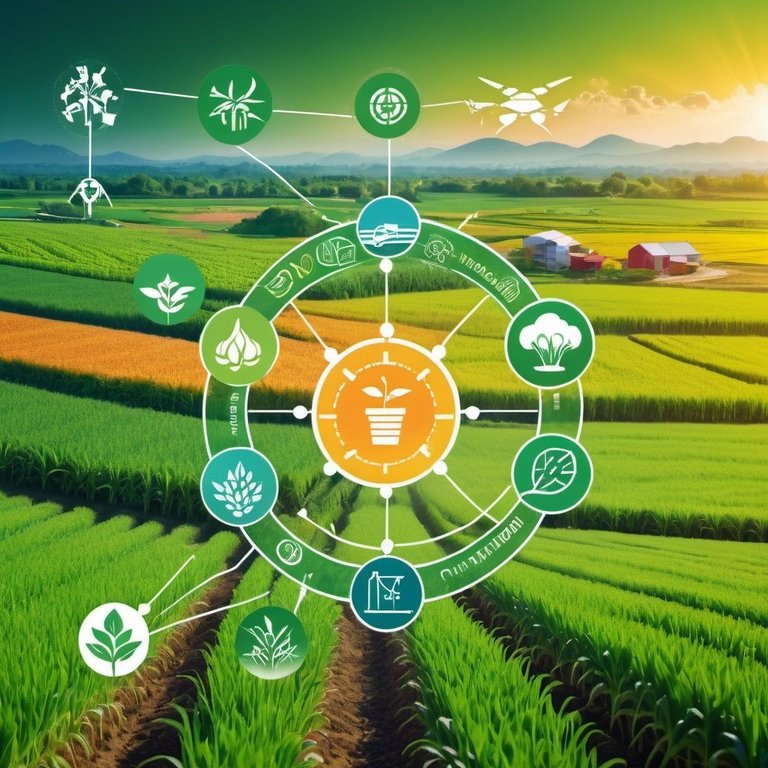Tokenizing the Future: How Blockchain is Transforming Agriculture and Beyond

As days pass, my list of real-world assets (RWA) tokenization is growing. It started with stablecoins, treasuries, shares in the automotive sector, gold, real estate, and now agricultural products:
Tokenized RWA: A New Era of Stability and Growth in the Crypto Space
Tokenizing Real Estate: Potential, Challenges, and the Path Forward
Reading this article is inspiring. We were told that the size of the agricultural market reached $2.7 trillion and bringing such an amount on-chain has the potential to revolutionize the industry.
The story as demonstrated by the pioneering efforts of Oldenburg Vineyards is just the beginning. The use of the Solana blockchain for wine exports is something new in international agricultural trades. Imagine that the transaction has been settled in seconds instead of days. Fees too were low. If stories like this will continue, I wonder about the kind of change it will introduce to agricultural trade.
The above article identifies three major challenges that the agricultural sector struggles particularly on the part of the supply chain:
Higher cost and friction in transacting between jurisdictions
Complexity of legal contracts
Profit disparity due to the fragmented nature of the supply chains requiring multiple intermediaries
Both tokenization and the use of blockchain technology will introduce the necessary innovation that the agricultural sector needs to liberate itself from the mentioned impediments. By embracing this change, the following advantages are anticipated:
Instant settlements of contracts
Removal of unnecessary documentation
A unified legal structure to the underlying trade process, and
A bigger profit for farmers
The use of blockchain technology reduces transaction costs and simplifies processes between jurisdictions and as such removes unnecessary friction.
The problems related to the complexity of legal contracts can also be solved through the simplified and automated process using smart contracts.
Profit disparity because of the fragmented nature of supply chains can also be solved through the removal of multiple intermediaries. It will reduce costs, improve transparency, and ensure a fairer distribution of profits. Moreover, this will give farmers more space to focus on production rather than administrative processes.
In the end, a price reduction of agricultural goods will be the natural consequence of all these changes that will benefit the consumers.
Ang aking listahan ng real-world assets (RWA) tokenization ay nadadagdagan sa paglipas ng mga araw. Nagsimula ito sa mga stablecoin, treasuries, share sa sektor ng automotive, ginto, real estate, at ngayon ay mga produktong pang-agrikultura:
Tokenized RWA: A New Era of Stability and Growth in the Crypto Space
Tokenizing Real Estate: Potential, Challenges, and the Path Forward
Ang pagbabasa ng artikulong ito ay nagbibigay inspirasyon. Sinabi sa atin na ang laki ng merkado ng agrikultura ay umabot sa $2.7 trilyon at ang pagdadala ng ganoong halaga on-chain ay may potensyal na baguhin ang industriya.
Ang kuwento na ipinakita ng mga pagsisikap sa pangunguna ng Oldenburg Vineyards ay simula pa lamang. Ang paggamit ng Solana blockchain para sa pag-export ng alak ay isang bagong bagay sa internasyonal na kalakalang pang-agrikultura. Isipin na ang transaksyon ay naayos sa ilang segundo sa halip na mga araw. Mababa rin ang mga bayarin. Kung magpapatuloy ang mga kwentong tulad nito, iniisip ko ang uri ng pagbabagong ipapakilala nito sa kalakalang pang-agrikultura.
Tinukoy ng artikulo sa itaas ang tatlong pangunahing hamon na kinakaharap ng sektor ng agrikultura lalo na sa bahagi ng supply chain:
Mas mataas na gastos at alitan sa transaksyon sa pagitan ng mga hurisdiksyon
Pagiging kumplikado ng mga legal na kontrata
Pagkakaiba ng kita dahil sa pira-pirasong katangian ng mga supply chain na nangangailangan ng maraming tagapamagitan
Ang tokenization at ang paggamit ng teknolohiya ng blockchain ay magpapakilala ng kinakailangang pagbabago na kailangan ng sektor ng agrikultura upang palayain ang sarili mula sa mga nabanggit na hadlang. Sa pamamagitan ng pagtanggap sa pagbabagong ito, ang mga sumusunod na pakinabang ay inaasahan:
Instant na pag-aayos ng mga kontrata
Pag-alis ng hindi kinakailangang dokumentasyon
Isang pinag-isang legal na istruktura sa pinagbabatayan na proseso ng kalakalan, at
Mas malaking tubo para sa mga magsasaka
Ang paggamit ng teknolohiyang blockchain ay binabawasan ang mga gastos sa transaksyon at pinapasimple ang mga proseso sa pagitan ng mga hurisdiksyon at dahil dito ay nag-aalis ng hindi kinakailangang alitan.
Ang mga problemang nauugnay sa pagiging kumplikado ng mga legal na kontrata ay maaari ding malutas sa pamamagitan ng pinasimple at automated na proseso gamit ang mga smart contracts.
Ang disparity ng kita dahil sa pira-pirasong katangian ng mga supply chain ay maaari ding malutas sa pamamagitan ng pag-alis ng maraming tagapamagitan. Babawasan nito ang mga gastos, pagpapabuti ng transparency, at titiyakin ang mas patas na pamamahagi ng mga kita. Higit pa rito, ito ay magbibigay sa mga magsasaka ng mas maraming espasyo upang tumutok sa produksyon kaysa sa mga prosesong administratibo.
Sa huli, ang pagbaba ng presyo ng mga produktong pang-agrikultura ang magiging natural na kahihinatnan ng lahat ng mga pagbabagong ito na magbibigay ng malaking kapakinabangan sa mga mamimili.
For those who are curious to create an InLeo account, click this link.
Posted Using InLeo Alpha
If this change is embraced, farmers will make more money
Yes, and they will be incentivized to be more productive.
Congratulations @rzc24-nftbbg! You have completed the following achievement on the Hive blockchain And have been rewarded with New badge(s)
Your next target is to reach 55000 upvotes.
You can view your badges on your board and compare yourself to others in the Ranking
If you no longer want to receive notifications, reply to this comment with the word
STOPCheck out our last posts: